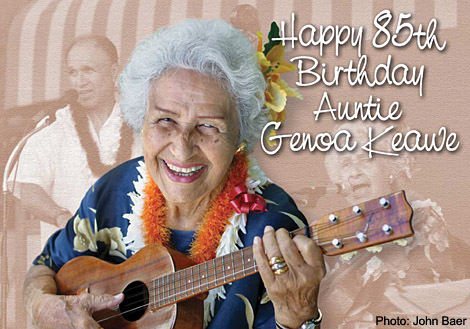|
A Legendary Hawaiian Performer By:Kathryn
Drury Despite
her years, traditional Hawaiian vocalist Auntie Genoa Keawe still boasts a
voice as clear and sparkling as spring water. She’ll grab hold of an
impossibly high note and then, when you’re impressed by the mere fact
that she hit it, she’ll effortlessly hold onto it – lifting overhead a
crystal orb of pure song – for what seems like five minutes. Few artists
have laid claim to Hawaiian music as completely as Auntie Genoa has and
after 70 years in the business, she’s as respected and beloved as
royalty. On Oct. 31, this Halloween baby celebrates another milestone: her
85th birthday. When
I met Ms. Keawe for our lunch interview, she emerged from a car sporting
“GENOA” license plates. She’s gracious and small, with beautiful
caramel skin, fluffy gray hair and a touch of begonia-pink lipstick. Just
as she has wooed audiences for decades, she has obviously also charmed the
staff at the Waikiki Beach Marriott Resort, where, for the past 9 years,
she has performed weekly. They open doors for us, usher us in and stop by
to kiss her hello. Did
you listen to music as a young person? Was there a radio or record player
in your home? Did
anyone teach you how to sing? Did you have to study music? You’re
originally from the Kakaako area of Honolulu. I read that you were born in
a stable; is that true? In
your early music career, you supplemented your income by working as a taxi
driver. Were you the only woman doing
that? You
had 12 children. You must have started young. How old were you when you
married your husband, Edward? Can
you explain the concept of “chalangalang?” I’ve
read that you give thanks to John Almeida for giving you a start, because
he invited “anyone who can sing” to come onto his radio show on KULA,
and you went in and performed. Were you nervous singing live on the radio?
I
understand that your husband’s mother spoke Hawaiian as her first
language and taught you, so you are able to sing in both Hawaiian and
English. Has your language phrasing changed over the years? No. But if
I had been singing something one way and I’d find out it was wrong, then
I would correct it. Some of the younger artists have a hard time
pronouncing Hawaiian words. I
think you’re best known for your falsetto vocal styling. In American
falsetto, singers try to hide the point where their voice changes
register, to make a smooth transition. But Hawaiian falsetto reminds me of
shifting a manual transmission on a car. Singers stress the “break” in
the voice as it pops it into a higher register. Can you explain how you do
it? When
you perform, you smile the whole time; you’re like a ventriloquist! How
do you smile, and more importantly, how do you breathe, while singing? How
can you sustain a note for as long as you do? Some
singers find their voices change as they mature. Have you found this to be
true, and if so, what effect has it had? You’ve
been recording since 1946, first on the 49th State label and later on Hula
Records. In 1966, you started your own company, Genoa Keawe Records. Why? How
did “Alika” become your signature song? Do
you surf? You
have a huge repertoire, singing and playing your ukulele to traditional
songs in Hawaiian as well as hapa haole music. How has the Hawaiian music
scene changed over the years? You’ve
been honored with the National Heritage Fellowship, presented by the
National Endowment for the Arts – the highest honor the country can give
to a traditional artist. And you’ve won many Na Hoku Hanohano awards.
Two years ago, you were inducted into the Hawaiian Music Hall of Fame.
What are your goals for the future? As we were leaving our lunch
meeting, a gentleman seated at a table near us flagged me over. “Who is
that?,” he asked, curious about the interview. “Was she a singer?”
“No,” I answered. “She is a singer.” You
can hear Genoa perform every Thursday evening from 6 p.m. to 9 p.m. at the
Waikiki Beach Marriott Resort. Grab a mai tai, order some sashimi, and
enjoy the ocean view while listening to one of Hawaii’s living legends. Also, on October 24th
there will be a special birthday celebration for Genoa Keawe at the Hawaii
Theatre Center, 1130 Bethel Street. Tickets and more information can be
obtained by calling 528-0506. |

